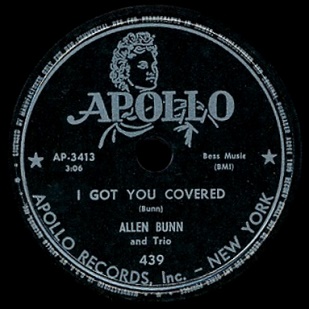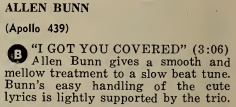Allen Bunn: “I Got You Covered”
11 Tuesday Apr 2023
Written by Sampson
Tags
No tags :(
Share it
APOLLO 439; JUNE 1952

When the guitarist, part-time lead singer and frequent songwriter for The Larks began cutting solo records on the side for the same label, it was largely out of a sense of obligation we covered his first release.
Having been the member of the group who steered The Larks towards bluesier material, and got them a hit in the process, his work on his own tended to confirm this was his preferred musical ideology.
Yes, it could be squeezed into a rock setting and we could justify its inclusion here, but truthfully if he wasn’t simultaneously singing with one of the best vocal groups in rock at the time we might not have given it a second look.
But THIS one is another story altogether, just not quite in the way any of us likely expected.
You’ve Got Too Much Nerve
If all you do is look at titles, or even scan a lyric sheet, you’d come to the logical conclusion that this record was a natural follow-up to Allen Bunn’s last single, The Guy With A 45, a very blues-laden song about messing with somebody packing heat.
Fight fire with fire I guess is the lesson here.
Maybe that WAS the intent of coming up with a song called I Got You Covered, but on this one Bunn delivers it in a style so far removed from the previous effort that it sounds like two different singers… in two different genres… in two different universes.

But then again, isn’t that the beauty of this music in the first place? That in the right hands it always has the capacity to re-imagine itself by taking similar themes and then overhauling every last thing about it, from the arrangement to the way in which it’s sung, until you can only see the connection through the aforementioned title and subject?
Creativity isn’t just coming up with something “new”, it’s coming up with new ways to do something old and if nothing else Allen Bunn definitely accomplishes that with this single.
Luckily for us he accomplishes quite a bit more than that too.
Let’s Have A Showdown
First thing’s first. I can’t imagine a scenario where this record in 1952, or any year for that matter, was going to be a huge hit.
I also can’t imagine a world in which I wouldn’t want this to come out in just for that very reason.
This is such a lo-fi recording that it’s almost feels like a waking dream put to record, as Allen Bunn takes a wide left turn from his harsher and deeper blues-centric voice and instead sings in a clear tenor that shows just how he was able to fit seamlessly into The Larks all this time. It’s melodic with a sense of eerie distance to it, like somebody singing from the shadows, which is entirely appropriate for the story he spins wherein he’s confronting somebody who’s been sleeping with his woman and has been caught in the act.
Though the theme and some of the lines may be equally effective if this was cut as a blues song, it’d be nowhere near as compelling if Bunn had used that kind of delivery.

Instead the higher tone, though less ominous in theory, becomes all the more threatening because he’s not trying to intimidate through a deeper, more aggressive vocal projection. He’s calm, measured and deadly serious as he’s backing down this adulterer, telling him I Got You Covered and that he’s got nowhere to go.
“The back door is locked, the windows are nailed down, come out through the front door let’s have a showdown” he says, practically crooning this in a way that you can envision a chilling half-smile on his face as he moves closer to the offender.
The record is mesmerizing from start to finish because there’s absolutely no sign of impending violence in the delivery itself, even as he’s brandishing a weapon and threatening the guy’s life at every turn.
About a decade ago Norah Jones came out with an atmospheric album masterpiece called Little Broken Hearts written in response to her being cheated on by her boyfriend with a friend of theirs. It featured some of the best production work you’ll ever hear from Danger Mouse and on it Jones uses the same techniques that Bunn does here. Both sing in a voice that betrays no overt anger, yet is all the more chilling because they’re using an almost dreamy tranquil state of mind to convey their intentions, as if the decision to kill the offending parties was not one that was about to cause them any sleepless nights.
One thing to keep in mind about human beings in general is that anger is an immediate reactionary response in the moment… it springs out of you instinctively when confronted with something that elicits that kind of primal reaction. But if it’s not released right away it doesn’t get MORE forceful and dangerous as time goes on, but rather less so. That’s when would-be tough guys start talking loud, trying to intimidate through their posture because they know they don’t have it in them to back it up.
But the person who controls that urge, who lets the anger fester and remains calm and calculating is the one to truly fear. Those are the ones who strike without warning, who are methodical and exacting in their revenge and that’s the kind of character Bunn comes across as being. He actually loses some of his menace when he describes what he’s going to do, but the lines themselves are so well-crafted we overlook that, especially since he never raises his voice to issue these threats.
It’s a lesson in the powers of persuasion… of using contradictory images – issuing threats in a soothing tone of voice – to convince you that every word is true.
If You Want To Stay Alive
Throughout this the piano plays a creeping slow boogie rhythm and the guitar chips in with key accent notes every so often just to keep you alert, setting a sparse, but by no means stark, atmosphere that contains plenty of melodic flow to never let you forget this is a song, not a scripted radio melodrama.
The one – and only – drawback to I Got You Covered is that we don’t get a satisfying resolution to the story.

He doesn’t have to end his life on the record itself for this to work to its fullest effect, but he’s got to either make it clear his demise is imminent as soon as the record ends, or he needs to leave the impression that he’s only sparing him as a sadistic choice to let the fear build inside this guy so he’s looking over his shoulder everywhere he goes.
The way the song leads us on though we suspect he does kill him in the end, but we don’t know for sure and the last stanza might be either one final merciless taunt from a true sociopath, or just a final scare tactic from somebody who’s not going to pull the trigger.
In real life we remain firmly opposed to any gun induced violence, acts which are always the final epitaph for cowards who turned to a gun to try and mask their own fear of the world around them, but in the context of a fictional plot in a song from seven decades in the past we’d make an exception just this once to find out for sure what happened when Bunn got him cornered on a record that is every bit as good as it is surprising to hear.
SPONTANEOUS LUNACY VERDICT:

(Visit the Artist page of Allen Bunn for the complete archive of his records reviewed to date)

